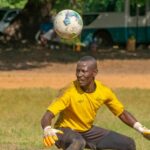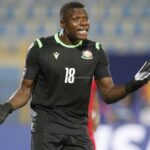The Super Eagles may have extinguished the Flames in Calabar, but celebration must not lead to complacency for Keshi and Co.
Published on September 10, 2013 at 9:07 AM by FACE OF MALAWI
By Ed Dove
For 90 minutes we all remembered, fondly, the successes and glories of early 2013.
As Stephen Keshi’s Super Eagles comfortably overcame the Flames of Malawi in Calabar we were together again and once more lived through the rapture of Rustenburg, the delight of Durban and the joy of Johannesburg.
It felt like all of the pieces were once more in place (excluding, of course, the injured Kenneth Omeruo and the off-colour Sunday Mba).
Victor Moses was electric down the left flank, and rekindled memories of the Cup of Nations group stage victory over Ethiopia with a calmly dispatched penalty and some dazzling runs.
Emmanuel Emenike, who opened the scoring just before half time, was at his clinical best (ignoring one disastrous miss in the second half) and led the line with aplomb. Oh how we missed those two during a stuttering and underwhelming summer.

Emenike: How you have been missed
However, perhaps one of the key positives to emerge from our months of malaise is a sense of balance and an appreciative sense of realism about some of the squad’s key components.
John Obi Mikel was imperious against Uruguay and Spain in the Confederations Cup, seemingly revelling in the increased responsibility. He was, once again, supreme against Malawi—majestic and languid in the middle of the park, keeping the team ticking over, spreading the ball like nut-free peanut butter on a warm slice of bread and caressing it around the park like one might stroke the shoulders of a lover.
A darting run through the Malawian midfield in the first half was one of several moments of excellence. He was, once again, transformed in the green of Nigeria, a world away from the sluggish lethargy that turns out for Chelsea, and was a justified winner of the Man of the Match bounty.
Alongside him, Ogenyi Onazi continues to grow into his role. The youngster is an excellent foil to Mikel, but don’t think he is Robin to John Obi’s Batman, no, Onazi is a very capable footballer in his own right, as was demonstrated by some moments of genuine class. Against Malawi we saw the attacking side of the Lazio man’s game.

Onazi: More than merely Robin
He struck a few inviting crosses, tested Simplex Nthala with a belter or two, and showed another side to the destructor we have come to depend on. His pass for Emenike’s goal, for example; this was a work of art. Think Sir Bobby Moore in the World Cup final of 1966, his seeking sentinel to find Sir Geoff Hurst bearing down on the German goal.
Sometimes it is the pass leading up to a memorable finish that is the true masterpiece. It is certainly a subject Onazi would be able to discuss with the late Sir Bobby. We are lucky to have such a precocious young footballer as the heartbeat of our national side.
Fegor Ogude, I fear, simply couldn’t contribute in the same fashion.
I will even reserve a word for Ahmed Musa. I have been somewhat critical of the forward’s big game contributions since his encouraging cameos at the 2013 Afcon. During the Confederations Cup he appeared, occasionally, to take too much on and to run out of ideas, or make the wrong decision, when opportunity came knocking.
He was much more of a subtle, probing, tantalising menace against Malawi, and I am led to draw the conclusion that, for now at least, Musa should be a compliment to Moses and Emenike, rather than our attacking focus. He is a potentially glittering option on the right side, but shouldn’t be too implicated in our extensive attacking build-up—not yet, at least.
Despite these positives, and a litany of others that I haven’t begun to touch on, it’s not yet the time to book the flights or light the fireworks just yet.
Our wonderful sister in literature, Chimamanda Adichie, once said that successful fiction doesn’t need to be validated by “real life.”
Unfortunately, successful football writing does.
I would only be reporting half the story if I was to gush unremittingly about our beautiful Big Boss and our sublime Super Eagles. In less than two weeks we will learn the identity of our play-off opponents, the team we will combat over two legs in a bid to make the World Cup.
There will be no easy options.
Being Nigeria, the possibilities will be heated local rivals, intense and intensely competitive North African opponents, or an undesirable trip to a faraway land.
Being Champions of Africa, any opposition will be highly motivated—as if the prospect of a World Cup place isn’t incentive enough.

Mikel: Will need to be at his imperious best against future challenges
Considering the probable Fifa Ranking—the classement which will influence the play-off draw—I foresee Nigeria taking on one of Senegal, Cameroon, Libya, Egypt, Ethiopia or Burkina Faso.
Now tell me, are there any of these oppositions that fill you with confidence untapped and expectation untrammelled? To me, they are a prickly and ominous bunch, none of whom will represent an easy ride.
We are all aware of the dangers of Cameroon and Senegal—both of whom will present hostile away trips and ferocious offensive threats. Egypt, more so than any other side, appear finally destined to end two decades of disappointment and hardship and qualify for a World Cup. I doubt the Pharaohs would let Nigeria stand in their way.
It took the Super Eagles 80 minutes to break down Ethiopia on neutral soil in January and the Walias, much like Libya or our fellow Afcon finalists Burkina Faso will realise that the glistening, once-in-a-career prospect of World Cup qualification is not one that they can let pass them by.
Facing any of these sides, home and particularly, away, will pose Keshi and his young Eagles a massive challenge. For a side that struggled past Kenya, Malawi and Namibia, progress is anything but guaranteed.
The reality is, that Brazil, and all the promise of next summer, draws a step closer.
But just a step.
Qualifying from the group is a fine accomplishment, but even the triumph against Malawi doesn’t totally mask our failings earlier in the group stage. This was a pool of teams that we should have by-passed easily, and long before this final clash, particularly considering that our three opponents all took points off each other.
There remain things to address and aspects to improve ahead of the bigger challenges that lie in wait. We are not there yet, but the boys will return to their club sides slightly more confident of being invited to the world’s grandest stage in 2014.
At least we won’t have to put up with listening to Tom Saintfiet anymore.


